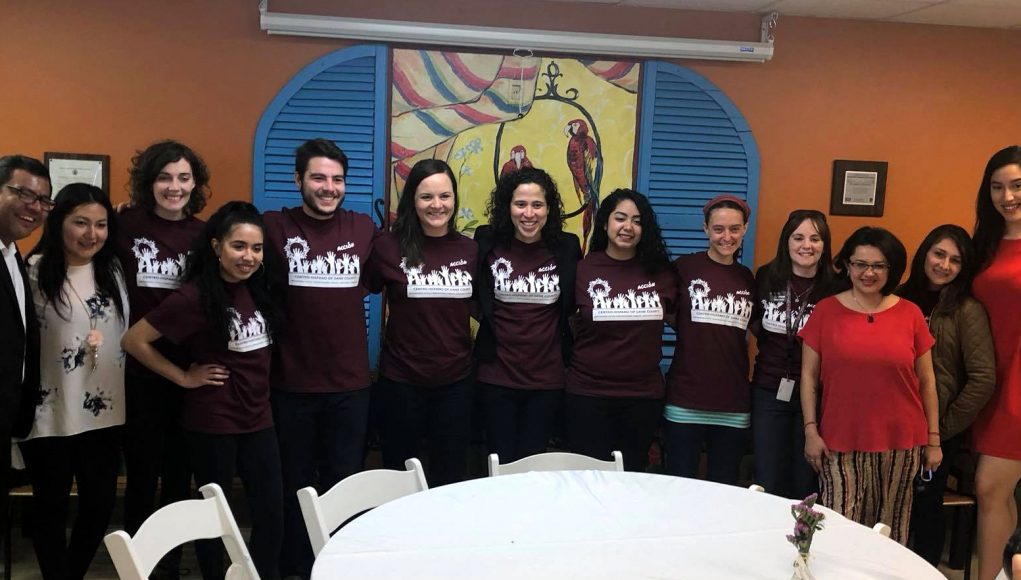“When you talk to parents and when you ask them why they moved here, they will say the answer is pretty simple, ‘Por una vida mejor.’ For a better life … and better future,” said Centro Hispano Board of Directors President Mario Garcia Sierra. “We want Centro to be that hope where they can come and hopefully participate in some of the programs that we have to move their families’ dreams forward because Madison is changing. There are a lot of positive changes happening.
“We want to be there to make sure that when that growth happens here in Madison, that our community is not pushed to the side,” he added. “That we aren’t left behind in that progress that is taking place here.”
Garcia Sierra spoke to business leaders and community partners at Centro Hispano’s Strategic Update Breakfast on April 26, the annual progress update on the agency’s strategic plan. Centro Hispano’s leadership team talked about the work it has done and the work it planned to do as the community heard testimonial from staff, board members, and the executive director.

Centro’s board of directors members have been actively working on a strategic plan of what the future of Centro should look like.
“It’s the idea of informed, sound decision-making,” said Centro board member Scott Lopez. “Whether you’re talking about the youth programs that they’re involved in or the adult programs that they are sponsoring, it gives people an opportunity to make informed, sound life-changing decisions. That’s what’s critical to our community here. We need to have folks that are doing the best that they can be and making contributions to the community. And that is what Centro is helping with.”

Karime Perez, Centro Hispano’s Wellness Program Manager, gave her own personal testimonial on Centro. Perez was born and raised in Mexico and worked for many years in the hospitality industry in Cozumel, Mexico, where she said many Americans and Europeans also made their home.
“But I was shocked to discover when I arrived in Wisconsin that people didn’t treat other cultures with the same respect that I was used to. Especially the Latino community that is essential to the economy,” Perez told the crowd. “I was upset to see the stark contrast between the lives of Latinos in Madison and the lives of Caucasians in Mexico. The majority of Latinos came here to work and to contribute to this nation. Some of us work two or three jobs to be able to take care of their families.

“Here is the contrast: I saw Americans living in Mexico being treated like kings and queens,” she added. “Here, my fellow Latinos were treated so poorly.”
Perez said she was excited to have the opportunity to work at Centro Hispano where people looked at her differently. “Centro Hispano provided me a place to work and to make a difference,” Perez said. “Working with communities can be rewarding, but it can also be exhausting. We are often swimming against the tide. That’s why I invite you to participate and become an ally. Support projects that are created by and for our community. Everybody deserves respect and to have a rewarding job. Everybody should be able to dream and live like Americans in Mexico without having the pressure of documentation, language, or lack of services.”
Centro Hispano Executive Director Karen Menendez Coller told the crowd that according to the 2014 Dane County census there are 32,000 Latinos in Dane County.
“That is a number we’ve been talking about every single year since I’ve been here. It’s up to us to keep that number in our forefront,” Menendez Coller says. “We’re the fastest-growing community in the city, the county, and the state.

“There are a lot of complexities for our community. There are a lot of families who are dealing with mixed immigrant status and what that brings to the table,” she added. “This agency is built to deal with those complexities because we have engaged in our process that is going to invest in our community and make sure that they have a voice here and are guiding our work moving forward.”
Menendez Coller said that they do much of the work they are doing now so in 10 years they won’t have to talk about certain issues facing the immigrant population.
“These issues will be a thing of the past. For me, we very much do it for the next generation,” she said. “So they can continue to have a space to dream and to take action. A space where they can build on their hopes and their future.
“We want to make sure our kids and our community are empowered,” she adds. “It’s really, really imperative that as we dream of the future of this organization, that we think about our organizational capacity … about everything that we need to make sure that this place is sustainable. We’ve built a tremendous amount in the last couple of years. I am determined to protect it from any threat that comes from the outside.”
Beth Cutler, community relations and foundation leader for CUNA Mutual Group Foundation, made a special announcement at the Strategic Update Breakfast that CUNA was re-upping on their monumental $100,000 grant from four years ago.
“The most important piece that Karen has is that passion – that willingness to talk about and work on tough issues that may create some noise, that may cause people to ask questions,” Cutler said. “But most importantly, to expect people like me to advocate and to use my voice to make sure that I’m encouraging our organization to continue to partner with an organization like Centro.
“You can feel the vibrancy of this organization when you walk in the door,” she added. “It doesn’t matter when I stop by, there’s life in this place. There’s community in this center. There is hope in this center. We know you will make this money work. We’re going to partner with you to allow you to achieve your dreams.”
Menendez Coller told the crowd that one of her idols was Dr. Martin Luther King Jr.
“I believe now is the time to start a new civil rights movement,” she said. “The civil rights movement of the past is not complete – there’s so much to be done. The plight of our community just adds to that even more. Please join us in action.
“This is a marathon; it’s not a sprint. We need support, we need to be nourished, we need to be trained and we need to have the capacity to succeed,” she added. “And I’ll be darned if Centro doesn’t win this marathon and our community does not win it, too.”



































